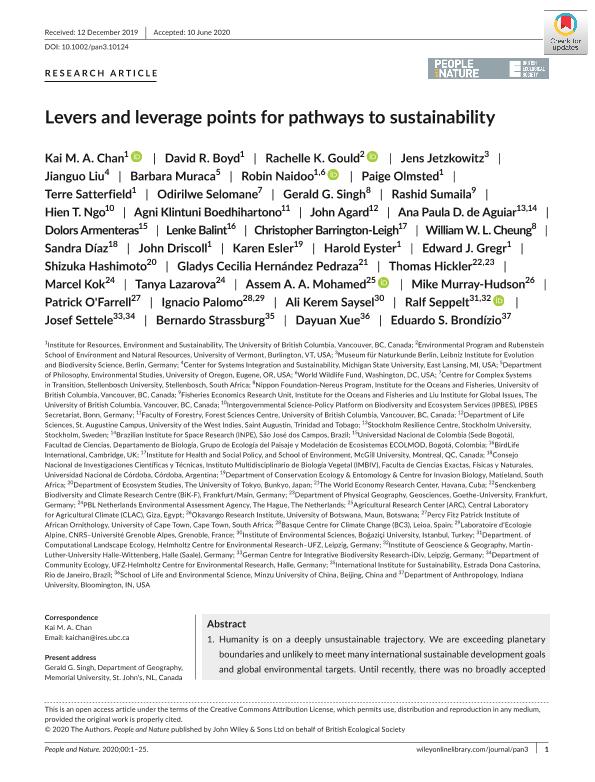Artículo
Levers and leverage points for pathways to sustainability
Chan, Kai M. A.; Boyd, David R.; Gould, Rachelle; Jetzkowitz, Jens; Liu, Jianguo; Muraca, Bárbara; Naidoo, Robin; Beck, Paige; Satterfield, Terre; Selomane, Odirilwe; Singh, Gerald G.; Sumaila, Rashid; Ngo, Hien T.; Boedhihartono, Agni Klintuni; Agard, John; de Aguiar, Ana Paula D.; Armenteras, Dolors; Balint, Lenke; Barrington-Leigh, Christopher; Cheung, William W. L.; Díaz, Sandra Myrna ; Driscoll, John; Esler, Karen; Eyster, Harold; Gregr, Edward J.; Hashimoto, Shizuka; Hernández Pedraza, Gladys Cecilia; Hickler, Thomas; Kok, Marcel; Lazarova, Tanya; Mohamed, Assem A. A.; Murray-Hudson, Mike; O'Farrell, Patrick; Palomo, Ignacio; Saysel, Ali Kerem; Seppelt, Ralf; Settele, Josef; Strassburg, Bernardo; Xue, Dayuan; Brondízio, Eduardo S.
; Driscoll, John; Esler, Karen; Eyster, Harold; Gregr, Edward J.; Hashimoto, Shizuka; Hernández Pedraza, Gladys Cecilia; Hickler, Thomas; Kok, Marcel; Lazarova, Tanya; Mohamed, Assem A. A.; Murray-Hudson, Mike; O'Farrell, Patrick; Palomo, Ignacio; Saysel, Ali Kerem; Seppelt, Ralf; Settele, Josef; Strassburg, Bernardo; Xue, Dayuan; Brondízio, Eduardo S.
 ; Driscoll, John; Esler, Karen; Eyster, Harold; Gregr, Edward J.; Hashimoto, Shizuka; Hernández Pedraza, Gladys Cecilia; Hickler, Thomas; Kok, Marcel; Lazarova, Tanya; Mohamed, Assem A. A.; Murray-Hudson, Mike; O'Farrell, Patrick; Palomo, Ignacio; Saysel, Ali Kerem; Seppelt, Ralf; Settele, Josef; Strassburg, Bernardo; Xue, Dayuan; Brondízio, Eduardo S.
; Driscoll, John; Esler, Karen; Eyster, Harold; Gregr, Edward J.; Hashimoto, Shizuka; Hernández Pedraza, Gladys Cecilia; Hickler, Thomas; Kok, Marcel; Lazarova, Tanya; Mohamed, Assem A. A.; Murray-Hudson, Mike; O'Farrell, Patrick; Palomo, Ignacio; Saysel, Ali Kerem; Seppelt, Ralf; Settele, Josef; Strassburg, Bernardo; Xue, Dayuan; Brondízio, Eduardo S.
Fecha de publicación:
09/2020
Editorial:
Blackwell Publishing Ltd
Revista:
People and Nature
e-ISSN:
2575-8314
Idioma:
Inglés
Tipo de recurso:
Artículo publicado
Clasificación temática:
Resumen
Humanity is on a deeply unsustainable trajectory. We are exceeding planetary boundaries and unlikely to meet many international sustainable development goals and global environmental targets. Until recently, there was no broadly accepted framework of interventions that could ignite the transformations needed to achieve these desired targets and goals. As a component of the IPBES Global Assessment, we conducted an iterative expert deliberation process with an extensive review of scenarios and pathways to sustainability, including the broader literature on indirect drivers, social change and sustainability transformation. We asked, what are the most important elements of pathways to sustainability? Applying a social–ecological systems lens, we identified eight priority points for intervention (leverage points) and five overarching strategic actions and priority interventions (levers), which appear to be key to societal transformation. The eight leverage points are: (1) Visions of a good life, (2) Total consumption and waste, (3) Latent values of responsibility, (4) Inequalities, (5) Justice and inclusion in conservation, (6) Externalities from trade and other telecouplings, (7) Responsible technology, innovation and investment, and (8) Education and knowledge generation and sharing. The five intertwined levers can be applied across the eight leverage points and more broadly. These include: (A) Incentives and capacity building, (B) Coordination across sectors and jurisdictions, (C) Pre-emptive action, (D) Adaptive decision-making and (E) Environmental law and implementation. The levers and leverage points are all non-substitutable, and each enables others, likely leading to synergistic benefits. Transformative change towards sustainable pathways requires more than a simple scaling-up of sustainability initiatives—it entails addressing these levers and leverage points to change the fabric of legal, political, economic and other social systems. These levers and leverage points build upon those approved within the Global Assessment's Summary for Policymakers, with the aim of enabling leaders in government, business, civil society and academia to spark transformative changes towards a more just and sustainable world. A free Plain Language Summary can be found within the Supporting Information of this article.
Archivos asociados
Licencia
Identificadores
Colecciones
Articulos(IMBIV)
Articulos de INST.MULTIDISCIPL.DE BIOLOGIA VEGETAL (P)
Articulos de INST.MULTIDISCIPL.DE BIOLOGIA VEGETAL (P)
Citación
Chan, Kai M. A.; Boyd, David R.; Gould, Rachelle; Jetzkowitz, Jens; Liu, Jianguo; et al.; Levers and leverage points for pathways to sustainability; Blackwell Publishing Ltd; People and Nature; 2; 3; 9-2020; 693-717
Compartir
Altmétricas



